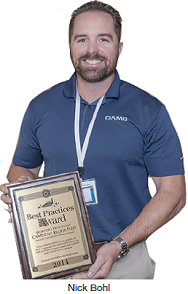Developing multi-skilled technicians at minimal cost
Best Practices Award
Challenge. In today’s gas-turbine facilities it has become the commonplace for the plant to be staffed with multi-skilled technicians. These technicians are expected to have knowledge in operating the facility as well as in performing the necessary maintenance. Finding a technician already trained in the different facets of maintenance (electrical, mechanical, I&C) with the ability to operate the plant is difficult.
For the most part, technicians are hired with a certain skillset, then expected to be trained in other areas. Many plants link employee raises and promotions to proficiency in new skills. There are three major problems with this that a plant or fleet must overcome:
- How do you go about providing training to these individuals to ensure that they are truly “multi-skilled?” This training must be effective enough to ensure the individual is truly grasping the concept and will be able to apply it when needed.
- Another major hurdle to overcome with this type of intensive training is cost. As we found out, the sky is the limit when it comes to training costs for your employees. There are plenty of options for you if money is no object for your company, but this is not the case for the majority. High-quality, cost-effective training that can be performed on your own terms is extremely difficult if not impossible to find.
- Once a technician has completed training, how do you ensure they maintain these skillsets to be effective over a long period of time? Unless a technician is using these skills on a regular basis, their effectiveness in certain areas will subside over time. Without having to pay for training all over again, how do you keep these skills fresh? The answer for us was to develop our own work force development program that would cover all of these identified problems.
Solution. The program is broken down into three separate crafts: electrical, mechanical, and I&C. The crafts are broken down even further into learning modules. These modules consist of computer-based training and hands-on instruction.
For the computer-based training, our company uses GPiLearn (GP Strategies Corp) with specifically chosen lessons and exams. The hands-on training is given by designated plant subject matter experts (SMEs).
The way the program works for initial qualification is the employee is enrolled in one of the three crafts based on what training the employee needs, or what the plant needs are at that time. When an employee is enrolled, he or she begins at training module No. 1 for the selected craft.
Once enrolled, the employee can log onto GPiLearn and begin taking the lessons and exams that have been designated for that training module. After the employee has completed the lessons, and passed the exams, they can then move onto the next step of that module which is the hands-on training.
It consists of designated job tasks the employee must learn from a plant-designated SME. These tasks directly correlate to the computer training that the employee just completed in that module. When an employee has successfully completed the hands-on training, the SME will initial their qualification card and the employee is then permitted to move onto the next module for that craft.
The modules are specifically designed to build off of one another. The early modules teach fundamentals as well as safety, then get progressively more difficult as the training continues.
We found that separating the training into individual modules significantly increased the employee’s knowledge retention. If you give an employee too much book or web-based training he or she tends to forget the earlier portions or lessons. But if you have them take a small number of lessons, then perform hands-on training based on those lessons, there is a much higher retention rate.
Once an employee has completed all designated modules for a given craft, he or she is then authorized to perform the final evaluation—a two-step process. First step is a 50-question exam done through GPILearn. It consists of 50 randomly chosen questions from exams the employee took during the earlier computer-based training program.
The employee must pass this test with an 80% or higher in order to move onto Step 2 of the process. If the employee fails the test he or she is allowed two more tries to pass. After three attempts, if the employee still has not passed with an 80% or higher, all of the GPiLearn training must be repeated for that craft.
Step 2 of the final evaluation process requires the employee to perform hands-on job tasks selected by an impartial evaluator. The evaluator chooses one job task from each module that the employee learned during his or her training.
Example: The electrical craft training consists of seven modules. For the final qualification, an employee is required to perform seven randomly chosen job tasks, one from each module. If the student fails any of the job tasks he or she is required to re-do this job task for the evaluator no earlier than two weeks from the fail date. If the employee fails the task three times, he or she is required to requalify in all job tasks for that module. Employees passing both the 50-question exam and the hands-on evaluation, are promoted and can be enrolled into the next craft training area.
To ensure an employee remains effective in each craft, we have implemented a triennial requalification process similar to the final evaluation process on the initial qualification. It consists of the 50-question exam as well as a hands-on evaluation.
The employee is allowed three attempts to pass the exam. If the person does not pass in three attempts, he or she cannot take the hands-on portion and must re-qualify in that craft. If the employee passes the exam, he or she is allowed to participate in the hands-on evaluation.
The employee must pass the randomly chosen hands-on job tasks in front of an evaluator. If the candidate fails any of the job tasks, he or she must retake the failed job tasks after two weeks have passed. If the employee passes all job tasks he or she has passed the re-qualification process.
Results. Since implementing our own workforce development program, we have had more craft qualifications in the past year than we have had over the previous seven years combined. This equates to better-qualified, more-knowledgeable technicians. These techs are able to diagnose and fix equipment issues when they happen, leading to shorter equipment down times and less money being spent on callouts for maintenance personnel or contractors.
We also have been able to identify weaknesses in a technician’s knowledge through the re-qualification process. This lack of knowledge is dangerous because it could lead to an employee being hurt or damaging equipment because they are trying to perform a job they are no longer qualified to do. Through the program they are then able to retrain and relearn skills they once had.
The employees also are happy with the program. They are able to increase their knowledge while at the same time the program provides them with a clear path for promotion and self-betterment. The ability to perform a majority of the maintenance at the facility on their own contributes to pride and sense of worth. Because all of this was done in-house, the cost was minimal. The only out-of-pocket cost to the company is the use of the GPiLearn website.
Project participants: Nick Bohl, Robert Kulbacki, Keith Charles, Randy Morton, Jim Riddle, Danny Luker, James Goins, and Mike Orduna.
CAMS East Region Fleet
Operated by Consolidated Asset Management Services
AL Sandersville, Effingham County Power, Mid Georgia Cogen, MPC Generating, SEDGCO, SEEDCO, Walton County Power, Washington County Power, Waterside Power.


